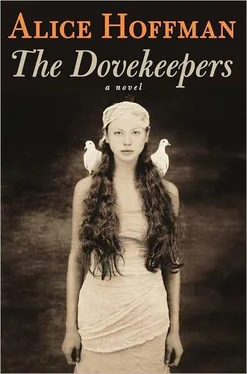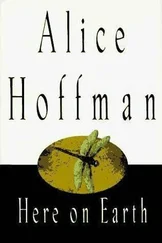Alice Hoffman - The Dovekeepers
Здесь есть возможность читать онлайн «Alice Hoffman - The Dovekeepers» весь текст электронной книги совершенно бесплатно (целиком полную версию без сокращений). В некоторых случаях можно слушать аудио, скачать через торрент в формате fb2 и присутствует краткое содержание. Год выпуска: 2011, ISBN: 2011, Жанр: Историческая проза, на английском языке. Описание произведения, (предисловие) а так же отзывы посетителей доступны на портале библиотеки ЛибКат.
- Название:The Dovekeepers
- Автор:
- Жанр:
- Год:2011
- ISBN:978-1-4516-1749-8
- Рейтинг книги:2.5 / 5. Голосов: 2
-
Избранное:Добавить в избранное
- Отзывы:
-
Ваша оценка:
- 60
- 1
- 2
- 3
- 4
- 5
The Dovekeepers: краткое содержание, описание и аннотация
Предлагаем к чтению аннотацию, описание, краткое содержание или предисловие (зависит от того, что написал сам автор книги «The Dovekeepers»). Если вы не нашли необходимую информацию о книге — напишите в комментариях, мы постараемся отыскать её.
The Dovekeepers — читать онлайн бесплатно полную книгу (весь текст) целиком
Ниже представлен текст книги, разбитый по страницам. Система сохранения места последней прочитанной страницы, позволяет с удобством читать онлайн бесплатно книгу «The Dovekeepers», без необходимости каждый раз заново искать на чём Вы остановились. Поставьте закладку, и сможете в любой момент перейти на страницу, на которой закончили чтение.
Интервал:
Закладка:
“You’re not afraid of the things other women fear,” he said.
I realized this was true. He still wasn’t looking at me, but he seemed to know me, even though I was hidden inside my veils. Most women feared for the lives of their children and husbands. Their concerns were starvation, illness, demons, enslavement. I feared the lions in my dreams, half-believing I would be devoured by one of the creatures that stalked through my sleep. I was afraid an angel would be waiting for me in the desert, sent there to tell me that my life was a ladder of mistakes, that I was born a murderer, responsible for the death of my own mother before I took my first breath, that my crime was worse than that of any assassin, for I was guilty not only in the eyes of my father but in the eyes of God.
Ben Simon took his hand away, but I could still feel the heat of his touch. I felt it for days. Did that mean he was an angel, hidden among us, there to judge me? Or was he only a man who wanted to satisfy himself?
WE WERE nearly going blind in the white light that pierced through our tent during the most brutal hours. Travel was impossible in the heat of the day, for the winds were merciless and could cut a man to pieces. We were city people who had strayed in the wilderness, wanderers with no direction, stranded in the territory of robbers, and thieves, and holy men. Emptiness was the name of the desolate land we crossed. We saw no one. When the pool of pale water disappeared into the sand, when even the mud left behind became hard-baked and dry, there was no reason for us to stay in our camp.
We packed up our few belongings — the goatskin tent, the handheld spindles we used to spin wool, our knives and the griddle, a jar in which there was still some oil, the lamp that we burned to mark the Sabbath, though there was little enough oil to do so. We moved on, searching for water. We ventured onward beneath the inky sky in the early mornings, during hours that were less brutal, before the sun emerged from the dark. Our route led us to a well, but it was dry. It led to an orchard, but it was barren. Olive trees had withered here, their silvery bark turned to empty shells. It was said that the nomads who crossed this wilderness were often forced to kill their camels and drink hot blood when their thirst could not be contained. There was no grass, and even the herds of ibex, wild goats who were unafraid to race across the rockiest cliffs, didn’t often venture into this harsh land. Only the leopards came here. Though they were mysterious and rare, we occasionally spied paw prints. These were the fastest animals in all creation, unearthly in their beauty, but they journeyed alone. Only those who lived cut off from all others of their kind would come here.
We went forward, believers with nothing to believe in. Our lips were so dry they cracked and turned white. Sia rubbed the last of the olive oil on her sons’ mouths, so their lips would not bleed. The days piled up like twigs, bent and useless. At last we found a cave to shelter us from the light and wind. There was a pool of still water, murky, with a lacy film across the surface, unclean, yet we put our faces into it like dogs. The east wind, Ruach Kadim, came up from Edom, flaming with heat. We wound ourselves in linen scarves, thin fabric made from flax, cooler than wool, perhaps because the reeds from which this fabric was made from had grown in marshes and carried water in the thread. We veiled our faces, making sure to keep our hands over our ears. Even then we couldn’t drown out the sound of the desert; the howling railed against us like a living being.
WE STAYED in the cave for days on end, too spent and parched to go on, afraid of meeting with the Roman garrison that patrolled the desert. We burned bits of the thornbushes we found to frighten away the jackals. A drift of white smoke rose from the mouth of the cave, the ash catching in our eyes and throats. The assassins hunted, but they found no game. They prayed, but there was no relief. I still cut my leg with a sharp rock. If I didn’t keep track of my life, no one else would. As time passed we began to starve. Again I wondered who among us could outlast the others. Our hunger kept us rapt and exhausted. We slept so many hours I could not tell the difference between my waking life and my dreams. I dreamed of Jerusalem and of my mother and of the flame tree in the marketplace. Those images were more real to me than the foul stink of the cave. Secretly, I had begun to eat the damp earth where moisture gathered near the rocks. My skin turned dusky, and it appeared that the desert was spilling out of me, the way they say sand pours out when you stab a demon with a knife that has been blessed and cleansed in pure water.
One night my father and Ben Simon slit the donkey’s throat. There are those who say animals have no spirits, but I heard the donkey scream. It had a voice like any man or woman, one that begged for breath and life. When I ran out to the cliffs, I could still hear its echo. The men said a prayer thanking God for what they had convinced themselves had been an easy death for the poor creature, for they’d used a ritual knife; then they made a fire out of a pile of twigs and roasted the meat. I could see pools of the donkey’s dark blood on the hillside below our cave. The stars were above us in the sky. Some could be seen quite clearly, others were hidden in the murk of the darkness. We waited for the morning star, which we named Cochav hashachar and others called Venus, looking for it to break through the sky in bands of pale, shimmering light and give us one more day.
After we ate, I felt defiled. The donkey’s bones simmered in a pot over the fire so that we might have food until the next Sabbath if we doled it out in scraps that we wolfed down. We were like people who had gone backward, barbarians in the desert. There were nomads who lived in this way; we saw evidence of them sometimes. They were wild men, pagans, their faces painted, their spears double-edged, their calls to each other the bleating of savages. Their lives depended on their camels, who gave them meat, and milk, and shelter when the tanned hides were stretched into tents. Their women gave birth in the sand, staining it slick and black; their dead were left on the rocks for the carrion; their men were exceedingly dangerous, for they had their own codes. No one who got in their way was spared. Some of these men had six wives, and the women were kept like donkeys, mistreated, used for bargaining.
Ben Simon had come upon the bodies of two of these wives. They were little more than children, likely not yet old enough to bleed with the moon. They had tried to run away from their circumstances and had fled as far as the desert would allow. Ben Simon discovered them when he was out hunting; they were buried beneath drifts of sand and stone, holding hands, their eyes staring, open to the World-to-Come. Both had coils of long black hair and wore the indigo-tinted scarves of their people. They had lain down to wait for death the way a bride waits for her bridegroom, the palms of their hands and the soles of their feet adorned with henna in intricate patterns of the thania ceremony, so that they might bring luck to the man they married. Perhaps they had been misused by their husband with no recourse or he had cast them aside. Perhaps they had run off together before the wedding ceremony and had lost their way.
I was cleaning out the cooking pot when Ben Simon signaled to me. I followed him even though we hadn’t spoken since he’d warned me of danger. He brought me to see the two wives. We did not speak, or even look at each other. I wondered why he’d chosen me to share this knowledge, why he had revealed to me that when the dust rose up and the dead were before him, this fierce assassin, who had murdered so many, who had washed the blood from his hands night after night, whose face was torn in two by a ragged scar, had tears in his eyes.
Читать дальшеИнтервал:
Закладка:
Похожие книги на «The Dovekeepers»
Представляем Вашему вниманию похожие книги на «The Dovekeepers» списком для выбора. Мы отобрали схожую по названию и смыслу литературу в надежде предоставить читателям больше вариантов отыскать новые, интересные, ещё непрочитанные произведения.
Обсуждение, отзывы о книге «The Dovekeepers» и просто собственные мнения читателей. Оставьте ваши комментарии, напишите, что Вы думаете о произведении, его смысле или главных героях. Укажите что конкретно понравилось, а что нет, и почему Вы так считаете.












